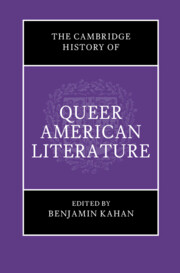Book contents
- The Cambridge History of Queer American Literature
- The Cambridge History of Queer American Literature
- Copyright page
- Contents
- Figures
- Tables
- Contributors
- Acknowledgments
- Introduction
- Part I Synchronic Histories of American Sexuality
- The Sexuality of American History
- 1 Trans/Atlantic Origin Stories
- 2 Queering the Founding; Or, the Revolution in Sex
- 3 Whither the Queer History of Slavery?
- 4 Queering Immigration and the Social Body, 1875–1924
- 5 The Queerness of World War II
- 6 Queer Bonds of Cold War Sexuality
- 7 “The Dead Never Die”
- 8 Fiction in the Post–Lawrence v. Texas Era, or Inventing Heteronormative Queerness
- Queer Literary Movements
- Part II Diachronic Histories of American Sexuality
- Part III Queer Methods
- Index
8 - Fiction in the Post–Lawrence v. Texas Era, or Inventing Heteronormative Queerness
from The Sexuality of American History
Published online by Cambridge University Press: 17 May 2024
- The Cambridge History of Queer American Literature
- The Cambridge History of Queer American Literature
- Copyright page
- Contents
- Figures
- Tables
- Contributors
- Acknowledgments
- Introduction
- Part I Synchronic Histories of American Sexuality
- The Sexuality of American History
- 1 Trans/Atlantic Origin Stories
- 2 Queering the Founding; Or, the Revolution in Sex
- 3 Whither the Queer History of Slavery?
- 4 Queering Immigration and the Social Body, 1875–1924
- 5 The Queerness of World War II
- 6 Queer Bonds of Cold War Sexuality
- 7 “The Dead Never Die”
- 8 Fiction in the Post–Lawrence v. Texas Era, or Inventing Heteronormative Queerness
- Queer Literary Movements
- Part II Diachronic Histories of American Sexuality
- Part III Queer Methods
- Index
Summary
This essay considers the impact of the Supreme Court’s decision in Lawrence v. Texas (2003) on the production of a particular kind of queer subject, a subject coded by the court as a part of heteronormative queer couple. After tracking the court’s representation, I turn to fiction published since this decision, demonstrating that fiction offers the nuanced and complex sense of queer subjectivity that is erased in the Lawrence representation. Contemporary queer fiction, I demonstrate, disrupts the court’s representation by offering representations of kin formations that are far more complex than a homonormative assimilative couple. These depictions explore the worlds inhabited by characters who more closely resemble Lawrence and Garner—kept out of the public view—than the metropolitan, privileged queer subjects of the Lawrence ruling. The representations of contemporary fiction disrupt the homogenizing national implications of the Supreme Court as well, by locating queer subjectivity in both diasporic and transnational subjects. Finally, the growth of queer speculative fiction challenges the concept of the normative more broadly, in both form and content.
Keywords
- Type
- Chapter
- Information
- The Cambridge History of Queer American Literature , pp. 158 - 172Publisher: Cambridge University PressPrint publication year: 2024

